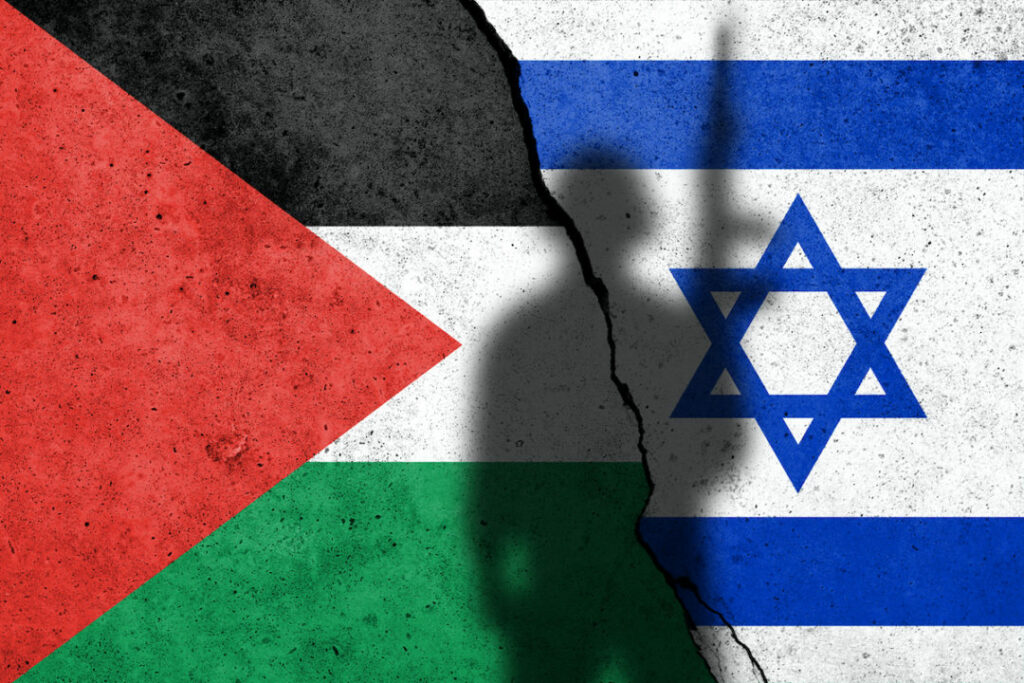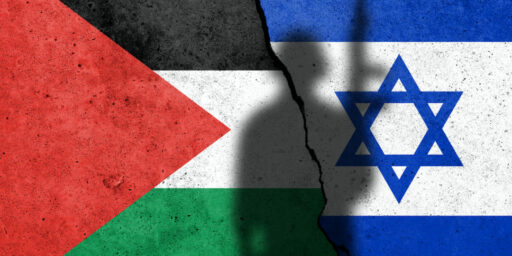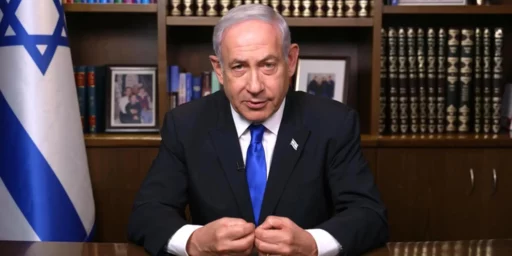Hamas Accepts Ceasefire That’s Almost Certainly Unacceptable to Israel
Neither side is willing to give up on its war aims just yet.

AP (“Hamas accepts a Gaza cease-fire proposal, but Israel hasn’t commented“):
Hamas announced Monday it has accepted an Egyptian-Qatari proposal for a cease-fire to halt the seven-month-long war with Israel in Gaza, hours after Israel ordered about 100,000 Palestinians to begin evacuating from the southern city of Rafah, signaling that a long-promised ground invasion there could be imminent.
There was no immediate comment from Israel on the deal, and details of the proposal have not yet been released. In recent days, Egyptian and Hamas officials have said the cease-fire would take place in a series of stages during which Hamas would release hostages it is holding in exchange for Israeli troop pullbacks from Gaza.
It is not clear whether the deal will meet Hamas’ key demand of bringing about an end to the war and complete Israeli withdrawal.
Hamas said in a statement its top leader, Ismail Haniyeh, had delivered the news in a phone call with Qatar’s prime minister and Egypt’s intelligence minister. After the release of the statement, Palestinians erupted in cheers in the sprawling tent camps around Rafah, hoping the deal meant an Israeli attack had been averted.
So, the aggressor has accepted a proposal offered by two non-parties to the conflict, the terms of which are not public, and which the other party to the conflict almost certainly won’t accept? Outsiders clearly hope so:
Israel’s closest allies, including the United States, have repeatedly said that Israel shouldn’t attack Rafah. The looming operation has raised global alarm over the fate of around 1.4 million Palestinians sheltering there.
Aid agencies have warned that an offensive will worsen Gaza’s humanitarian catastrophe and bring a surge of more civilian deaths in an Israeli campaign that in nearly seven months has killed 34,000 people and devastated the territory.
U.S. President Joe Biden spoke Monday with Israeli Prime Minister Benjamin Netanyahu and reiterated U.S. concerns about an invasion of Rafah. Biden said that a cease-fire with Hamas is the best way to protect the lives of Israeli hostages held in Gaza, a National Security Council spokesperson said on condition of anonymity to discuss the call before an official White House statement was released.
There is considerable and growing pressure within Israel to reach a deal to obtain the release of the hostages. But, rather clearly, that’s not the top priority of the unity government.
Netanyahu said Monday that seizing Rafah, which Israel says is the last significant Hamas stronghold in Gaza, was vital to ensuring the militants can’t rebuild their military capabilities and repeat the Oct. 7 attack on Israel that triggered the war.
Lt. Col. Nadav Shoshani, an army spokesman, said about 100,000 people were being ordered to move from parts of Rafah to a nearby Israel-declared humanitarian zone called Muwasi, a makeshift camp on the coast. He said that Israel has expanded the size of the zone and that it included tents, food, water and field hospitals.
The IDF has been preparing for this attack for weeks now. Why would they abandon it, giving their enemy the time to regroup? What would they get in exchange that would make that worthwhile? Again, while they would welcome the release of the hostages, that’s clearly not enough.
The international pressure is certainly understandable:
The U.N. says an attack on Rafah could disrupt the distribution of aid keeping Palestinians alive across Gaza. The Rafah crossing into Egypt, a main entry point for aid to Gaza, lies in the evacuation zone. The crossing remained open Monday after the Israeli order.
Jan Egeland, secretary-general of the Norwegian Refugee Council, condemned the “forced, unlawful” evacuation order and the idea that people should go to Muwasi.
“The area is already overstretched and devoid of vital services,” Egeland said. He said that an Israeli assault could lead to “the deadliest phase of this war.”
The was is already a humanitarian nightmare. Pushing the population of Rafah into parts of Gaza that are already destroyed is, to say the least, not a good option. But, given the Israel determination to attack, seemingly the best one available.
In a fiery speech Sunday evening marking Israel’s Holocaust memorial day, Netanyahu rejected international pressure to halt the war, saying that “if Israel is forced to stand alone, Israel will stand alone.”
On Monday, Netanyahu accused Hamas of “torpedoing” a deal by not budging from its demand for an end to the war and a complete Israeli troop withdrawal in return for the hostages’ release, which he called “extreme.”
Granting the pot/kettle aspect of this, neither side’s will to fight has been exhausted. Standing down now returns the first-mover advantage to Hamas, who would be free to murder Israeli civilians at their leisure. But, given that Hamas is a terrorist group that’s only nominally a state-like actor, it has never been clear how a “permanent” peace is possible here.





It’s not the IDF’s decision to launch or not to launch an attack. Its Bibi’s decision.
And he’d abandon it if it were a bargaining chip of some sort. I mean, Gaza is pretty small and it’s right there. If it were important to attack Rafah, why give weeks of warning? Doesn’t this just let Hamas plan ahead, set traps, put up fortifications, etc.?
There may be reasons why, and Rafah may not be a bargaining chip.
So what will be? What actually is the end goal here?
At this point, attacking Rafah when Hamas is willing to accept a peace deal (even one you don’t like) is going to burn through what little good will Israel has left with the world. Making a nightmare even worse is going to solidify them even further as “bad guys” to the world because at what point is it enough? Gaza is tiny AF as is – they are absolute correct in telling Israel to give it back and GTFO. Otherwise it’s a land-grab in the vein of Russia & Crimea – a BS excuse to cover taking what the bigger country feels is “theirs”.
Here’s the thing: nothing. There’s nothing short the enemy ceasing to exist that will prevent them from regrouping. In fact, an entire new generation of young militants have been created and energized by experiencing the humanitarian nightmare, practically ensuring another attack in a few years. This is what happens when you seek disproportionate vengeance: they survive and come back to continue the cycle. Look at what happened after 9/11 and we wreaked vengeance on the ME. We didn’t get rid of al-Qaeda but got ISIS to boot. We were there long enough to see the young people affected by our initial blitz get old enough to strike back.
You cannot stop the cycle of hate and violence with more violence. You’d think after centuries of evidence we’d know that by now. Future radicals are born from the outrages they currently endure.
Everyone deserves to live in safety and not worry about violent nutcases coming to kill you. That goes for Israelis and Palestinians. Even if they get Hamas today, there will be another tomorrow born from the misery and cruelty the kids are suffering. You are just creating the same problem with a different name down the line. You want Hamas gone? Make them irrelevant by making conditions better. Make it so no one wants to join or wants them around because they don’t need them… and right now, a hell of a lot of people are feeling they might need them to strike back for the same reasons Israel was feeling on 10/7. We are seeding the future with poison the longer this goes on.
@KM:
A cease-fire is not a peace deal. Hamas rejects a two-state solution. They reject peace with Israel. What they want is a breather to re-arm and launch another attack. Don’t believe me? Ask them. Nor does Hamas care about civilians in Gaza. Again: their own statements.
If Hamas intends to renew attacks – as they say very clearly – then what peace do you think will follow from a cease-fire?
As for the world’s good will, please, the UN has passed more resolutions condemning Israel than it has Saudi Arabia, Iran and North Korea combined. The world would barely tut-tut if every Israeli were wiped out tomorrow. Which is why Israel knew it needed nukes.
Israel is going to continue negotiations and the Rafah offensive:
Seems pretty clear the idea is to pressure Hamas from both directions.
@KM:
Both Israel and Hamas have been rejecting deals for months. The idea that Hamas is now ready for “peace” and Israel isn’t misunderstands that negotiations have been going on for quite a long time and the two sides remain far apart on fundamental questions.
As to whether one doesn’t like the deal or not, no one seems to know what the terms are that Hamas has supposedly accepted. No one is going to sign a blank check. The fact that the terms of this deal weren’t negotiated with Israel (the country Hamas is actually fighting) and haven’t been published is a pretty big red flag.
I’ll just point out again that never in history has there been a case of modern urban warfare when civilians are present, especially when one party to the conflict uses civilians for tactical and strategic advantage, which didn’t result in a huge amount of civilian deaths and suffering.
The only times it’s avoided are when civilians are either evacuated from the battlespace or allowed to flee.
Since no one, not even those who claim to support and care about Palestinians, want to allow them even to have the choice to leave Gaza, and since no country is willing to host them even temporarily, they are stuck there. This is such an ironclad consensus that no one even bothers talking about it.
So yes, getting as much of the population out of Rafah as possible is the only thing that will reduce or prevent civilian casualties other than Israel just choosing not to fight Hamas at all.
@Andy: It’s a horrible thing to watch but Hamas is doing its damnedest to maximize noncombatant casualties. Israel either gives up its war aims or kills a whole lot of innocents being used as human shields.
@James Joyner:
Can Israel achieve its war aims?
If not, then continuing the campaign looks a lot worse.
@James Joyner:
International humanitarian law is very clear on which of those is a war crime. And no, that is not in any way a defense of Hamas.
@DrDaveT: You are correct that the use of human shields is a war crime under both textual and customary international humanitarian law.
“There is considerable and growing pressure within Israel to reach a deal to obtain the release of the hostages. But, rather clearly, that’s not the top priority of the unity government.”
That’s interesting given that I’ve lost count of how many times people have said that that’s all that needs to be done for the war to end.
@James Joyner:
I’m curious about the definition of human shields as it seems to be used quite frequently.
On the one hand, there are pretty easy examples… command and control or military centers under hospitals.
However, the very existence of Hamas is considered as them using human shields… Gaza is not a very open space where formal military camps could be set up far away from civilian areas (and I understand that Israeli intelligence HQs are in downtown Tel Aviv.. if Israel was fighting a conventional war with a conventional foe, would targeting them lead to accusations of the Shin Bet using the populace of Tel Aviv as human shields?).
Hamas is also a resistance movement – which is, let me emphasize, not to minimize their use of terror tactics and atrocities. In most ways how does their behaviour distinguish them from resistance movements in the past (in terms of melting into the general population etc)? If the US came under foreign occupation would resistance fighters adhere to strict codes of conduct?
@James Joyner: ” It’s a horrible thing to watch but Hamas is doing its damnedest to maximize noncombatant casualties. Israel either gives up its war aims or kills a whole lot of innocents being used as human shields.”
Wow. It’s like only Hamas has any agency, and poor Israel is forced to do exactly what they want.
“Oh, no, they’re making us starve all those civilians to death! Those bastards!”
@Assad K:
People obviously want the hostages back. The rub is what they are willing to give to Hamas to get those hostages back. Opinions vary.
As far as Hamas and “Human shields” it goes far beyond putting their critical infrastructure under protected places. They’ve built extensive tunnel networks and fight primarily from tunnels which they’ve described in interviews. Almost all of these are under houses, apartments, streets, stores, etc.
Besides hiding and fighting from tunnels under civilian infrastructure, they use civilians and protected places as part of their warfighting tactics in various ways:
– dressing like civilians
– purposely taking up fighting positions or launching rockets from schools, mosques, etc.
– using civilian vehicles and protected vehicles (like ambulances) for tactical transport
The fact that Israeli infrastructure may be located in cities is not comparable. Every government in the world has military infrastructure in cities. The is done for various practical reasons, not for the purpose of intentionally using its civilian population for tactical and strategic advantage. You’ll note, for example, that Iran, at least, made an attempt with it’s major attack to target military infrastructure. Hamas makes no distinction between civilian and military. They live by the motto “settlers are not civilians” that rubes in the West sometimes repeat. This is why they lob rockets at civilian areas with regularity and slaughter military or civilian Jews (and the Jew-adjacent) whenever they can.
Hamas is not a resistance or insurgent movement. It’s the de facto government and governing authority of Gaza. Hamas doesn’t need to melt into the population because it controls Gaza – at least it did until it decided to attack Israel, triggering Israel’s invasion. Gaza has not been occupied since 2005, and Hamas has no legitimate excuse not to follow the rules of warfare, even the most basic ones, like not murdering and beheading civilians and only attacking military targets. They don’t limit themselves that way because their goals are explicitly genocidal, unlike most every other resistance movement or a hypothetical scenario where the US came under foreign occupation.
@James Joyner:
Cute, but disingenuous. The two choices were both Israel’s — modify their war goals, or kill a lot of innocents. The relative legal and ethical status of those choices is not affected by how evil Hamas is.